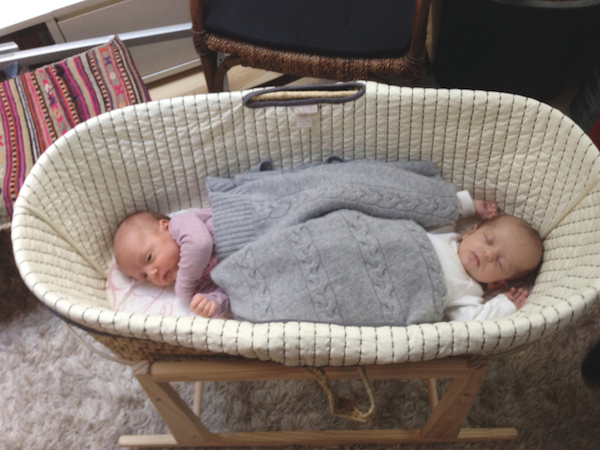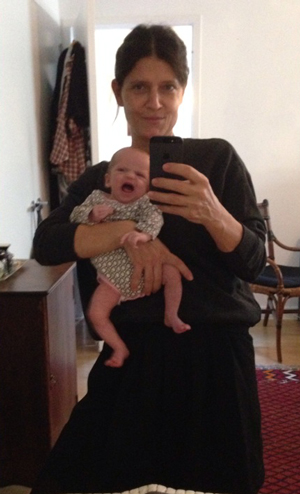
BY JOSH ROGERS | They’ll be home for Christmas.
Actually, Georgia and Cecilia Roccos Smithmyer, two of the youngest residents of the Financial District, are home now. Cecilia, born with her twin sister Nov. 12, hadn’t prompted any more worry than expectant parents usually have, but Georgia, formerly known as Baby B, was facing major surgery and a long recovery right after her birth.
Doctors at Mount Sinai operated on Georgia two days later, and much to their surprise, she recovered fully in a week and came home for a last-minute Thanksgiving celebration.
“Wow, what a Thanksgiving,” their mother, Christina Roccos, said this week. “How can we be any more thankful than to have two healthy babies?”
Roccos, her husband Martin Smithmyer, and their daughter Antonia, 6, were vacationing in France this summer when two doctors there discovered a “dark shadow” on the babies’ sonogram.

A third French doctor diagnosed Georgia’s condition as duodenal atresia and warned that there was a danger she would be born with Down syndrome.
Roccos said she was not worried about Down since the babies had genetic testing as part of I.V.F. (in vitro fertilization), but was still scared because of the pending surgery.
Duodenal atresia is a rare condition in which the small bowel is blocked. Many Down syndrome babies have the blockage, but there is no causal relationship between the conditions.
Roccos said the excess fluid created by the atresia meant she was carrying the equivalent of triplets.
Because her first birth was at Mt. Sinai, Roccos was already planning to deliver there again.
Even before Georgia’s diagnosis, Roccos’ pregnancy was classified as high risk because of her age, 48, and the fact that she was carrying twins.
Her condition made her unable to take the subway to the Upper East Side hospital, so Roccos took taxis for weekly exams the last few months of her pregnancy.
Dr. Aaron Lipskar, who performed the surgery with Dr. Peter Midulla, said it was a particularly tricky procedure because Georgia was born at only five-and-half-pounds, “so everything is smaller.”
Because of the baby’s size, the doctors were unable to do a laproscopic incision, which means the Georgia has a larger scar – Roccos joked that her baby inherited her mother’s C-section mark.
Lipskar had thought it would be at least a few weeks if not months for Georgia to recover, but “she really did quite well.”
She doesn’t have the bloated stomach or the vomiting common after surgery. In fact, Roccos said right now Georgia appears slightly healthier than Cecilia, who has a little acid reflux, a common condition for newborns.
Dr. Lipskar said Mount Sinai performs about five to ten surgeries a year for duodenal atresia out of perhaps two dozen done in the city, but most are done laproscopically.
Roccos calls Lipskar and Midulla “my rock star surgeons,” and has been struggling with what to do for them.
“What do we do — send them a box of chocolates or flowers,” she asked. “How do we thank them.”
In a separate phone interview Lipskar laughed when told of Roccos’ words.
“They’re the ones who are rock stars,” he said. “It’s very scary to have your baby born and not be perfect, we had to emphasize Georgia was perfect— she just had a little defect. I’d hate to think of myself as a rock star.”
Nevertheless, Roccos, who volunteers her time for needy children, is thinking of doing something more — perhaps making a donation to help babies with duodenal atresia.
She’s not particularly religious, but her happy ending at Christmas time is not lost on her.
“It makes us more appreciative this time of year,” she said. “It makes us want to give something back. It’s not a fair world — some people have so much and some have so little and we never take that for granted.”
Like past years for the family, presents will be opened in FiDi Christmas morning before they drive to Maryland to spend part of the day with Smithmyer’s family. This year though, the parents will be taking a rental.
“Our little S.U.V.”, Roccos said, “is not going to hold this big family.”

































